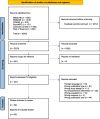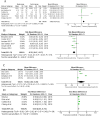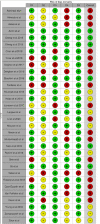Empowerment interventions designed for persons living with chronic disease - a systematic review and meta-analysis of the components and efficacy of format on patient-reported outcomes
- PMID: 37626346
- PMCID: PMC10463815
- DOI: 10.1186/s12913-023-09895-6
Empowerment interventions designed for persons living with chronic disease - a systematic review and meta-analysis of the components and efficacy of format on patient-reported outcomes
Abstract
Background: Empowerment approaches are essential for building the capacity of individuals with chronic disease to be in control of their health. Reviews of empowerment interventions have been focused on specific chronic diseases, thereby limiting the scope of findings. This study had three aims: 1) to describe the characteristics of empowerment interventions covering a broad range of chronic diseases, 2) to clarify consistency with the World Health Organization`s (WHO) definition of empowerment as a process composed of four fundamental components and 3) to summarize outcome measures and estimate the effects in group and individual intervention formats.
Methods: Systematic literature review and meta-analysis. CINAHL, Medline, Embase, PsycINFO, Web of Science, COCHRANE and Central Register of Controlled Trials were searched using Chronic Disease, NCD, Empowerment, as MeSH terms. Eligible randomized and quasi randomized controlled trials were included. Review Manager 5.4 was used to conduct the meta-analysis. Risk of bias was assessed with the Cochrane risk-of-bias tool (ROB 2).
Results: Thirty-nine articles representing 8,011 participants were included in the review. A majority (82%) of studies reported robust evidence for changes on study-defined outcome measures in favor of interventions. Intervention content was assessed against WHO's four fundamental components of empowerment, showing that all studies incorporated one component, but none targeted all components. Components reflecting knowledge acquisition, patient engagement with their health care providers and facilitating environment were scarcely reported. Meta-analyses found evidence for positive effects of group-format interventions measuring empowerment, HbA1c, and self-efficacy. Effects on empowerment were also found in some individual-format interventions. High levels of heterogeneity and variability among the conceptual frameworks were identified.
Conclusion: Empowerment interventions in group-format were most efficient, however, considerable conceptual inconsistencies were identified. Future studies should consolidate conceptual understandings by using WHO's empowerment framework to ensure that fundamental components of empowerment are explicitly included in intervention design. Furthermore, there is a need to clarify the role of empowerment through pathways that include patient activation, self- management, and clinical outcomes. This systematic review will inform the clinicians and researchers who aim to develop novel empowerment interventions to assist patients in the process of gaining control of their health.
Trial registration: PROSPERO: International Prospective register of systematic reviews ID=CRD42020178286.
Keywords: Chronic disease; Empowerment; Interventions; Meta-analysis; Person-centered care; Self-management; Systematic review.
© 2023. BioMed Central Ltd., part of Springer Nature.
Conflict of interest statement
The authors declare no competing interests.
Figures





Similar articles
-
The future of Cochrane Neonatal.Early Hum Dev. 2020 Nov;150:105191. doi: 10.1016/j.earlhumdev.2020.105191. Epub 2020 Sep 12. Early Hum Dev. 2020. PMID: 33036834
-
Beyond the black stump: rapid reviews of health research issues affecting regional, rural and remote Australia.Med J Aust. 2020 Dec;213 Suppl 11:S3-S32.e1. doi: 10.5694/mja2.50881. Med J Aust. 2020. PMID: 33314144
-
The Effectiveness of Integrated Care Pathways for Adults and Children in Health Care Settings: A Systematic Review.JBI Libr Syst Rev. 2009;7(3):80-129. doi: 10.11124/01938924-200907030-00001. JBI Libr Syst Rev. 2009. PMID: 27820426
-
Behavioural modification interventions for medically unexplained symptoms in primary care: systematic reviews and economic evaluation.Health Technol Assess. 2020 Sep;24(46):1-490. doi: 10.3310/hta24460. Health Technol Assess. 2020. PMID: 32975190 Free PMC article.
-
Psychological interventions to improve self-management of type 1 and type 2 diabetes: a systematic review.Health Technol Assess. 2020 Jun;24(28):1-232. doi: 10.3310/hta24280. Health Technol Assess. 2020. PMID: 32568666 Free PMC article.
Cited by
-
Development and pilot testing of an empowerment-based educational app for complementary therapies in diabetes: a Delphi study.Int J Nurs Stud Adv. 2025 May 15;8:100353. doi: 10.1016/j.ijnsa.2025.100353. eCollection 2025 Jun. Int J Nurs Stud Adv. 2025. PMID: 40495979 Free PMC article.
-
Empowering Chinese university health service providers to become mental health champions: insights from the ACE-LYNX intervention.Front Psychiatry. 2024 Mar 22;15:1349476. doi: 10.3389/fpsyt.2024.1349476. eCollection 2024. Front Psychiatry. 2024. PMID: 38585479 Free PMC article.
-
Rethinking Models of Chronic Kidney Disease Care: A Narrative Review.Kidney Blood Press Res. 2025;50(1):433-441. doi: 10.1159/000546562. Epub 2025 May 23. Kidney Blood Press Res. 2025. PMID: 40414206 Free PMC article. Review.
-
Strengthening HIV Activism Among Clinicians in Malaysia: A Randomised Controlled Trial.AIDS Behav. 2025 Jul 21. doi: 10.1007/s10461-025-04829-1. Online ahead of print. AIDS Behav. 2025. PMID: 40691430
-
Narrative review of recent developments and the future of penicillin allergy de-labelling by non-allergists.NPJ Antimicrob Resist. 2024 Jul 10;2(1):18. doi: 10.1038/s44259-024-00035-6. NPJ Antimicrob Resist. 2024. PMID: 39843524 Free PMC article. Review.
References
-
- Haugan G, Eriksson M. Health Promotion in Health Care - Vital Theories and Research. New York: Springer; 2021. - PubMed
-
- Heggdal K. Utilizing bodily knowledge in patients with chronic illness in the promotion of their health: a grounded theory study. Californian J Health Promot. 2013;11(3):62–73. doi: 10.32398/cjhp.v11i3.1542. - DOI
Publication types
MeSH terms
LinkOut - more resources
Full Text Sources

